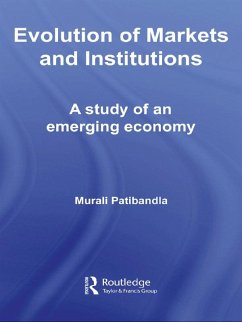This branch of economics stresses the importance of institutions in the functioning of free markets, which include elaborately defined and effectively enforced property rights in the presence of transaction costs, large corporate organizations with agency and hierarchical controls, formal contracts, bankruptcy laws, and regulatory institutions. In this timely volume, Murali Patibandla applies some of the precepts of the new institutional economics to India - one of the world's most promising economies.
Dieser Download kann aus rechtlichen Gründen nur mit Rechnungsadresse in A, B, BG, CY, CZ, D, DK, EW, E, FIN, F, GR, HR, H, IRL, I, LT, L, LR, M, NL, PL, P, R, S, SLO, SK ausgeliefert werden.









